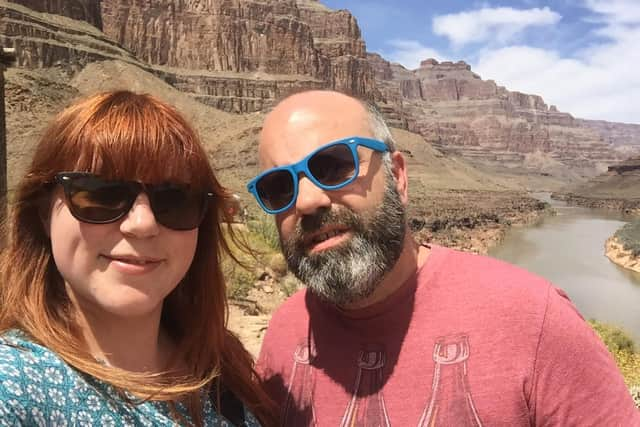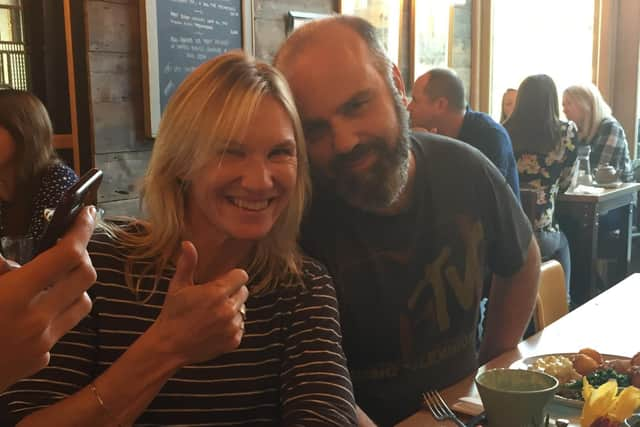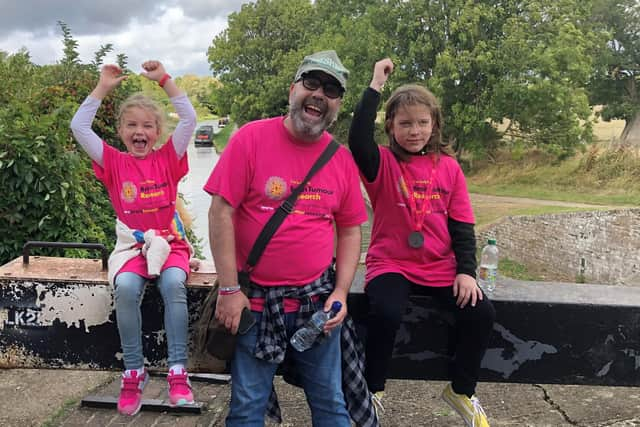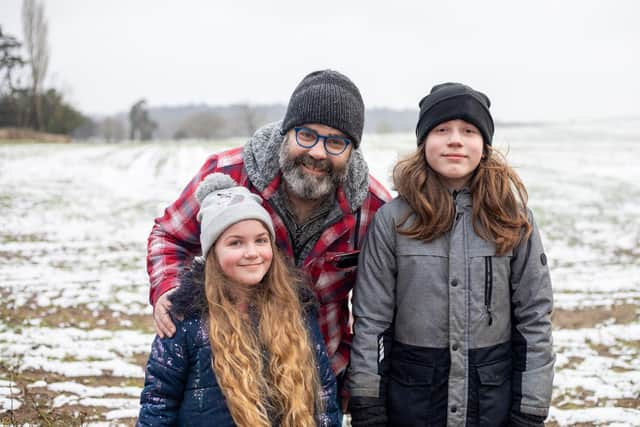Milton Keynes charity pays tribute to 'larger-than-life' BBC radio producer on first anniversary of his death
and live on Freeview channel 276
A Milton Keynes charity has paid tribute to the 'larger-than-life' BBC radio producer who died exactly one year ago today (3 March).
Brain Tumour Research, which is based in Shenley Wood, is paying its respect to Simon Willis, from Aspley Guise.
Advertisement
Hide AdAdvertisement
Hide AdSimon died after suffering with an aggressive and incurable brain tumour, he was best-known for working with some of the best radio broadcasters in the world.


He worked with the likes of Zoe Ball, Jo Whiley, Simon Mayo and the late Terry Wogan.
The accomplished producer passed away after surgery on a glioblastoma (GMB), aged 51, leaving two children Bevan and Honor, who were then 13 and 9 respectively.
Simon was a keen supporter of Brain Tumour Research, and took part with his children in the charity’s Walk of Hope in 2019.
Advertisement
Hide AdAdvertisement
Hide AdHe also visited The Brain Tumour Research Centre at Imperial College London to find out about the work scientists are undertaking to find a cure.


Jo Whiley, who is godmother to Bevan, while Simon was godfather to all her children, said: “It’s been a year since we said goodbye to Simon.
"Our dearest friend, the light of our lives and the butt of every family joke ever. We miss him every second of every hour of every day and life without him feels dimmer and heavier.
"Simon was so brave throughout his illness. There was no self-pity. He fought his brain tumour - with humour and strength - so that he could be here for his children and his family for as long as possible.
Advertisement
Hide AdAdvertisement
Hide Ad"Throughout his treatment - which was incredibly tough - he raised money and awareness for Brain Tumour awareness and I owe it to him to ask you all to help support Brain Tumour Research this Brain Tumour Awareness Month and get us closer to defeating this terrible disease.”


Hayley, Simon's widow, described him as a larger-than-life character and devoted father.
The 51-year-old was diagnosed after an MRI scan on Christmas Eve 2017, following a year of symptoms including fatigue and confusion.
He was admitted to Milton Keynes Hospital as they were worried he might have a seizure because of the size of the mass and the amount of swelling around it and was put on steroids.
Advertisement
Hide AdAdvertisement
Hide AdSimon underwent surgery early in the New Year at the John Radcliffe Hospital in Oxford. On his birthday – 30 January – he was given the histology results: he had a grade 3 anaplastic astrocytoma.


Following the craniotomy, Simon had radiotherapy and gruelling chemotherapy.
A Brain Tumour Research Spokesman said: "In March 2020, when the coronavirus pandemic properly hit, Hayley noticed that Simon hadn’t grasped how serious it was and wasn’t taking precautions.
"Towards the end of the year, Simon had become quite snappy, which was very out of character.
Advertisement
Hide AdAdvertisement
Hide Ad"A scan revealed that the tumour was growing again and he underwent further surgery on the tumour which had progressed to become a glioblastoma (GBM) in January 2021, but never really recovered from it. Simon appeared very confused, although he had moments of lucidity.
"When his behaviour became increasingly confused over the course of a week and it became apparent that his head was swelling, he had another scan and a blood clot was found. Simon was put on anti-coagulants."
Hayley said: “At 5am on 3 March 2021, I got a call to say Simon had passed away. Apparently, he had stood up to go to the toilet and the clot had shifted and that was it.”
Brain tumours are indiscriminate and can affect anyone at any age.
Advertisement
Hide AdAdvertisement
Hide AdCharlie Allsebrook, community development manager at Brain Tumour Research, said: “Our thoughts are with Simon’s family and friends particularly today.
“Simon’s story reminds us that just 12.5% of those diagnosed with a brain tumour survive beyond five years compared with an average of 50% across all cancers.
"We cannot allow this desperate situation to continue. Brain Tumour Research is determined to change outcomes for brain tumour patients and ultimately find a cure.”
Brain Tumour Awareness Month culminates each year in Wear a Hat Day which takes place on 25 March 2022 in aid of Brain Tumour Research.
Advertisement
Hide AdAdvertisement
Hide AdBrain Tumour Research funds sustainable research throughout the UK.
It also campaigns for the Government and the larger cancer charities to invest more in research into brain tumours in order to speed up new treatments for patients and, ultimately, to find a cure.
The charity is calling for a national annual spend of £35 million in order to improve survival rates and patient outcomes in line with other cancers such as breast cancer and leukaemia and is also campaigning for greater repurposing of drugs.